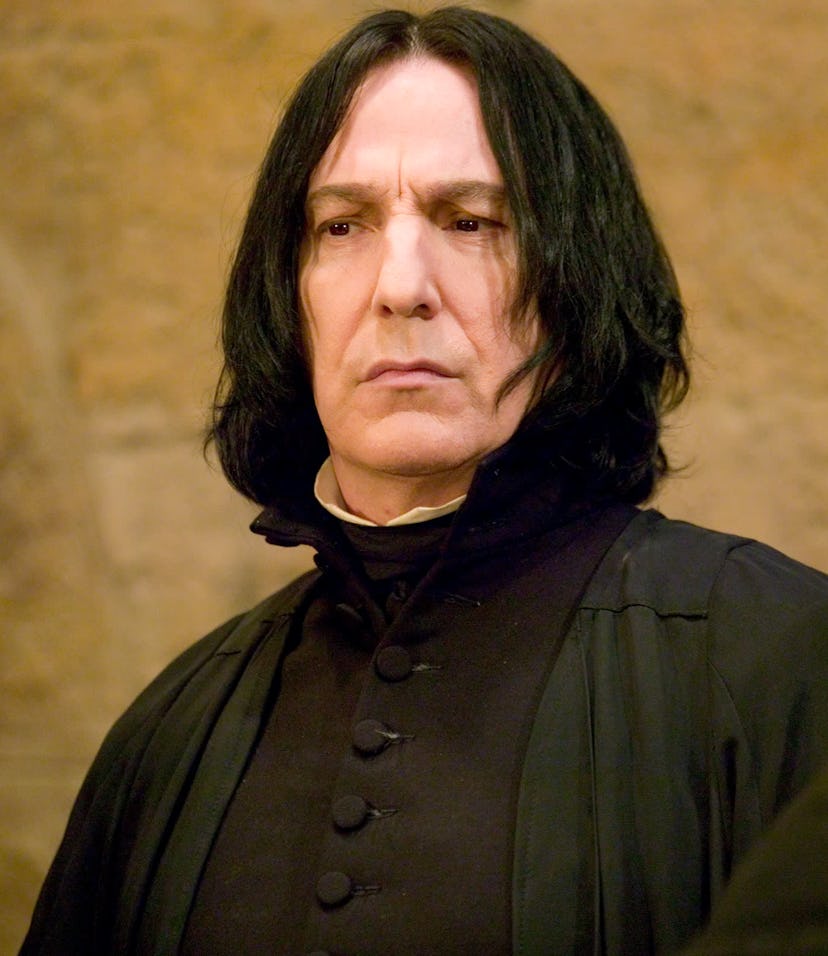
Alan Rickman's Diary Excerpts Reveal He Wanted To Quit Harry Potter
He also had *thoughts* about his young co-stars.
Turns out, there’s a good reason why the late Alan Rickman was the perfect Severus Snape. In newly published excerpts from the actor’s decades-spanning diaries, Rickman’s true thoughts about the Harry Potter franchise finally come to light, and some of them are even more brutally honest than Snape’s harshest insults. While he could see some magic in the movies, Alan Rickman’s diary revealed he actually wanted to quit the Harry Potter saga a few times over disappointments in the wizarding saga’s story and direction.
The new details come courtesy of a Sept. 24 piece in The Guardian, which included excerpts from the upcoming book Madly, Deeply: The Diaries of Alan Rickman (hitting shelves on Oct. 18). Turns out, Rickman kept personal journals throughout much of his professional career, including the 10 years he played the prickly but ultimately well-intentioned potions professor Severus Snape. Although the Harry Potter movies came to be one of Rickman’s best-known projects, he didn’t always connect with the saga. In a diary entry from the fall of 2000 ahead of filming the first movie, Rickman wrote that he was “feeling a bit nothing about HP which really disturbs me.”
Two years later in 2002, Rickman revealed he spoke to his agent about quitting the franchise following the second movie: “Talking to [agent] Paul Lyon-Maris about HP exit, which he thinks will happen ... Reiterating no more HP. They don’t want to hear it.”
Obviously, that exit didn’t happen. And although Rickman would go on to appreciate many elements of his time in Hogwarts — he’s particularly effusive about 2004’s Prisoner of Azkaban, praising director Alfonso Cuarón’s “extraordinary job” in creating “the work of an artist and storyteller” — he didn’t feel creatively fulfilled by all of his time on those sets. He wrote that he felt “shafted” by the The Goblet of Fire’s focus on visuals, and after viewing The Half-Blood Prince in 2009, he expressed “the need to bang the three Davids’ heads against the nearest wall,” speaking about Harry Potter producers David Heyman and David Barron, and director David Yates. “I get the character development and the spiffing effects (dazzling), but where is the story????” he wrote.
Rickman also had some quibbles about Snape’s most iconic scene. While filming The Deathly Hallows — Part 2, the actor wrote that director David Yates was being “stubborn” about Voldemort murdering Snape with a spell. “Impossible to comprehend, not least the resultant wrath of the readers,” Rickman wrote, going on to share his soon-to-be wife Rima Horton agreed with his assessment: “He can’t kill you with a spell — the only one that would do that is Avada Kedavra and it kills instantly — you wouldn’t be able to finish the scene.” In the end, Rickman got his way, as Voldemort instead slashed Snape’s throat with the Elder Wand and then had his snake Nagini finish the job. “It’s the absolute example of what can happen when a couple of actors pick up a scene off the page and work with the story,” Rickman wrote of the scene. “As I said at one point to David — it’s all a bit epic and Japanese.”
In the end, Rickman didn’t fully love watching the final Harry Potter movie, as he noted in a 2011 diary entry: “I found it unsettling to watch — it has to change horses midstream to tell the Snape story and the camera loses concentration.”
He also had some stern first impressions of his young co-stars when they started the franchise. “These kids need directing. They don’t know their lines,” he wrote. Of Daniel Radcliffe specifically, he mused, “I still don’t think he’s really an actor but he will undoubtedly direct/produce.” He was also critical of Emma Watson’s accent: “Emma’s diction is this side of Albania at times.”
However, despite his critiques, Rickman did find joy in telling Snape’s story once he learned its touching truth. “This was a genuine rite of passage. One small piece of information from Jo Rowling seven years ago — Snape loved Lily — gave me a cliff edge to hang on to.”
This article was originally published on